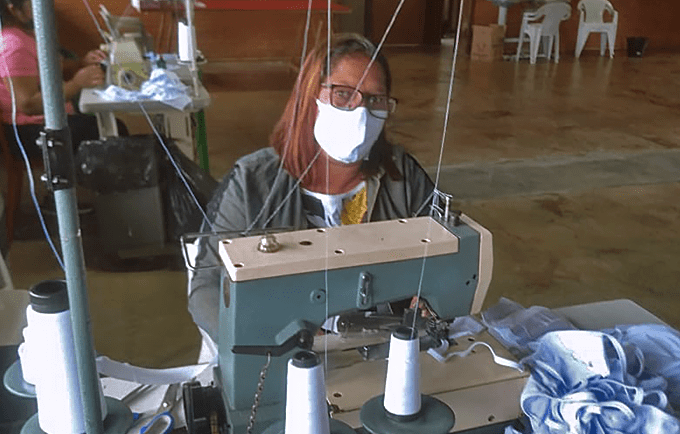Gislene Pereira, a 51 years old Brazilian seamstress who lives in a rural area close to the Federal District has a little business of custom shirts that was brutally affected during the pandemic. Until the COVID-19, she used to make shirts for events, such as birthday parties, and uniforms for companies and churches. “All the orders I had were canceled. My whole production shutted down”, she says. Through a social project supported by UNFPA Brazil, the Fábrica Social Jardim Botânico, an initiative of a neighborhood communitarian movement, Gislene got back to the work sewing cloth masks, something she has never made before.
The United Nations Population Fund in Brazil will buy 3 thousand cloth masks and a thousand towels from the project. The items will integrate Dignity Kits expected to be delivered to homeless people in the streets of the Federal District, through a partnership with the Health’s secretary. Gislene is one of the people there are currently making the products, which has allowed her to have an income again. “If it wasn't for this project, I wouldn’t be able to pay my bills and eat”, she recalls.
According to Ilton de Queiroz, the executive director of the movement, the project started by making cloth masks to the houses in the neighborhood condominium, recruiting and paying Brazilian workers in a very harsh situation, like Gislene, and also Venezuelan refugees. The purchase from UNFPA Brazil was fundamental to make the project take off. “So far, we have 12 families benefiting from it”, he says.
During a short training, Gisele had the opportunity -- adopting all the prevention measures and using her own cloth masks, of course -- to meet the Venezuelan refugees that are also being on the project. They became, with a little effort, coworkers and friends. “I have trouble understanding them, since I don’t speak Spanish, but we get along. We started by talking about dressmaking and it worked”, she giggles.
Health and employment
According to the Reproductive Health Commodity Security Programme Officer of UNFPA Brazil, Nair Souza, the UNFPA chose to buy the masks and towels specifically from a project that benefits people in vulnerable situations. “We saw an excellent opportunity to assure that this group of Brazilian and refugees have income during the pandemic and, at the same time, receive the products that will help homeless people to prevent the COVID-19”, she explains.
The kits will be delivered to homeless people through a partnership with the Health’s secretary of the Federal District, containing, besides the masks and towels, hygiene items such as soap and hand sanitizer. The delivery operation is expected to happen in the second half of May.


